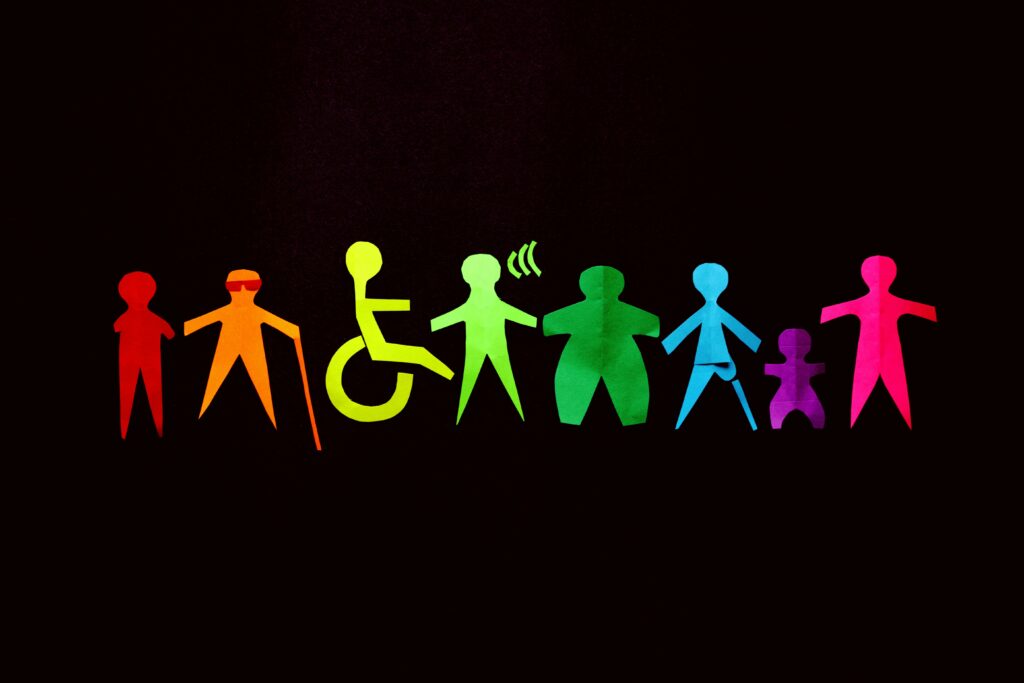Parenting a child with a disability, mental health diagnosis, or chronic illness can be challenging. It often falls to the caregiver to adapt activities, manage their child’s behavior, and navigate social norms. When you’re managing your own health conditions at the same time, it’s easy to end up with a flare, exhaust yourself – or come to the realization that it’s just not worth it.
When my own child was younger, I was eager to take her to library story times. I grew up an avid reader and couldn’t wait to share this love with her. We joined her first story time when she was still a toddler – a couple years before her diagnoses started to stack up. The experience was eye opening, to say the least.
While her peers sat crisscross-applesauce on the rug, my child roamed the room, disrupting other families and running off with story time props. Again and again, I pushed my creaky joints off the rug and dragged her back to my lap – trying to meet that expectation that we sit quietly and listen. By the time we left, she was in a full-blown meltdown and I was exhausted. I vowed to never attend another story time – it just wasn’t worth it.
That was more than a decade ago, and a lot has changed for the newest generation of parents. Slowly but surely, adapted and inclusive programming is becoming more common. These programs are designed to support kids who need a different model thrive. Because they are tailored to kids with disabilities and other concerns, they can also be a lot easier for caregivers who are working with a limited number of “spoons.” But to make the most of them, you have to know where and how to look for them… how to find your village.
1. Start with Early Intervention
Each state has its own early intervention program (funded by part C of the Individuals with Disabilities in Education Act/IDEA), serving children from birth to age three. And while the services offered by these programs vary, early intervention professionals often have their fingers on the pulse of programs and services in your community.
Finding your state’s early intervention program is as easy as Googling “early intervention” and your state’s name. Once you’re there, look for your local office and reach out.
2. Ask at School
Since the pandemic, many schools no longer allow nonprofits and other organizations to send printed fliers home with students. These fliers end up in “flier connection” distributions that many families don’t know about! For example, in our own district, you have to know exactly where to look on the district website to find fliers (a little button at the bottom of the page).
If you’re not sure where to look within your child’s school district, reach out to your school’s communication director. No communication director? Ask administrative assistants, the pupil services office, or special education teachers.
3. Find Your Community Nonprofits
One of the big reasons we now have adapted story times at library branches in Northeast Ohio is the work of community nonprofits. My own employer has led the charge in Cleveland’s western suburbs, educating libraries and spreading successes – like the programs and resources at Westlake Porter Public Library. Other local nonprofits have continued to chip away at accessibility issues, making the needs of our community known at our zoo, sports venues, and beyond.
To find community nonprofits involved in the disability community near you, try searching “disability nonprofit” and your community’s name.
4. Find Your Parent Training and Information Center (PTIC)
Under IDEA, each state also has its own parent training center. These resources support families with children who receive special education services. While PTICs tend to offer resources more aligned with special education needs, they’re also involved with the disability community as a whole and can point you toward local resources.
In Northeast Ohio, the PTICs co-sponsor annual resource fairs where many families find programming, summer camps, and more.
5. Look for Diagnosis-Specific Organizations
If your child already has a diagnosis, the easiest way to find groups and programs that will accept your family is to start with diagnosis-specific organizations. Many have national and local chapters that are just a Google search away. In our patch of the Midwest, families gather for programming at GiGi’s Down Syndrome Achievement Center, The Autism Society, The Epilepsy Association, and others.
Adapted and inclusive programming won’t solve all your problems, but it does offer a safe, welcoming space where your child can be themselves. And when you’re already low on spoons, these programs offer a way to help your child thrive without taking more than you can manage.

